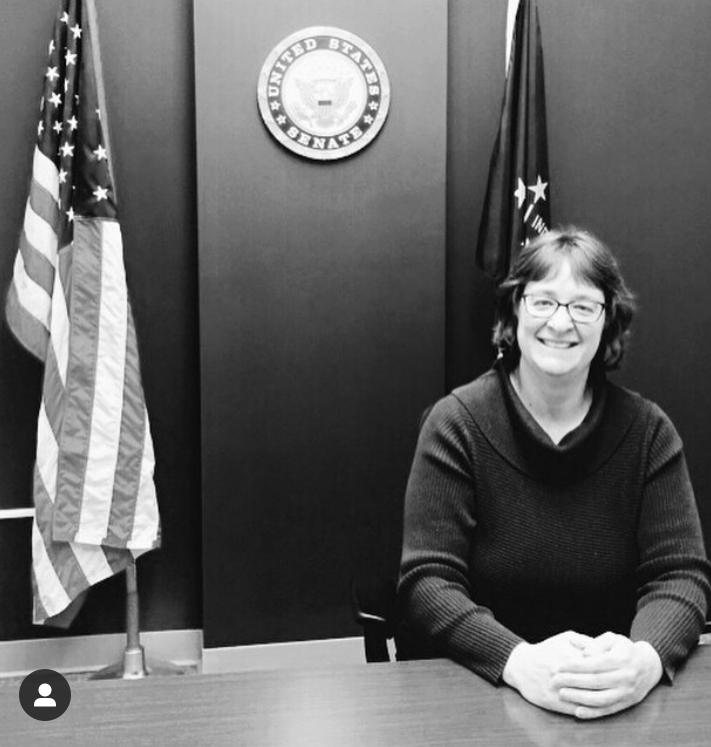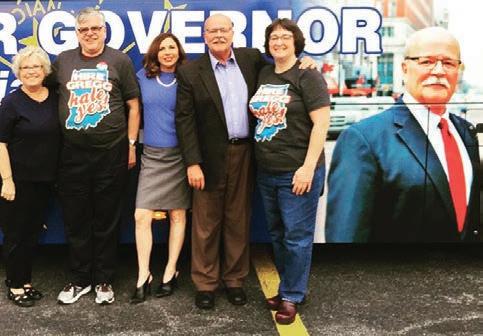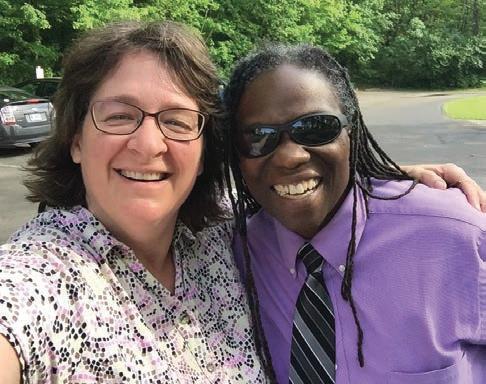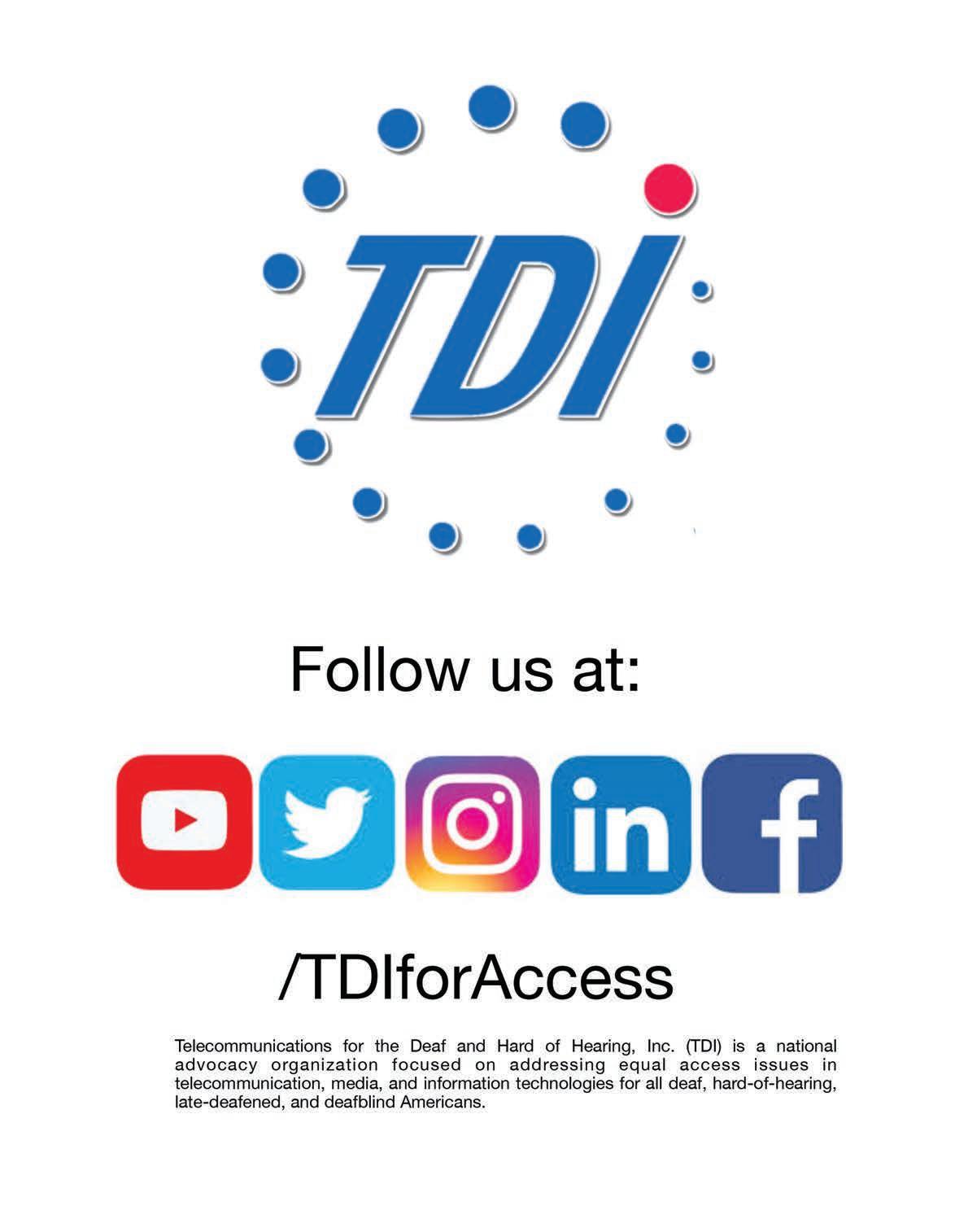
7 minute read
My Campaigning Experience
years old! I also went to a fundraising event for State Representative Christina Hale and met 10 other deaf people there as well. Along with nine other deaf people, we canvassed more than 1,000 homes! The key was to work closely with the campaign manager. When I attended Organization Days (which happened two weeks after Election Day) – I met deaf community members, Michael Reis, a deaf native Hoosier Historian, and Sharon Wesley Dunn. There was no interpreter, but we were able to rely on Twitter and follow a journalist who was reporting live from the statehouse.
Later, in 2014, I decided to become more involved with Rep. Hale’s campaign. This was a huge accomplishment for me because I worked hard to get people to donate to Rep. Hale’s campaign and encouraged deaf people to register to vote. This was the first time a deaf constituent hosted a private fundraiser at someone’s home. Small, but important networking events like that helped Rep. Hale win the election.
Advertisement
Then, in 2016, Rep. Hale decided to run for Lt. Governor. At Rep. Hale’s Election night party, there were interpreters and more than 20 people who attended. Even though she lost, it was still a memorable event for me because we were able to talk with other attendees about accessibility. In 2018, I got involved with Congressional District 5 Dee Thornton’s campaign. I learned it is important to work with other deaf community members to be sure that we are on same page and learn new things together. There was an interpreted Q&A session at a local coffee shop for the deaf community and we invited Candidate Dee Thornton. We also joined the interpreted Debate between Congressional District 5 Susan Brooks and Candidate Dee Thornton – this event was hosted by the League of Women Voters.
To show how invested we were, we held a fundraiser at the deaf club – we used the opportunity to educate other deaf community members why it is important to vote and how to support a candidate. Fundraising is important because it shows the candidate that you are committed to vote for them. Look at it this way, their mailings and yard signs cost a lot of money. By having a yard sale, both you and the candidate are more visible.
With only a two-day notice, I joined Governor Candidate John Gregg’s bus tour for one day and visited six cities with Michael Reis. Indiana Association of the Deaf covered the interpreting costs. We managed to get four deaf people in two different cities to meet us. This was definitely a rich experience! I visited U.S. Senator Joe Donnelly’s office during an open house. I was asked a lot of questions about my hobbies, what personal stories I have, and so on. Even though it lasted an hour, it was definitely worth my time.

I was often notified of events at the last minute and had to scramble for interpreters or means of access so I could attend and participate. Last minute events made it very challenging to schedule interpreters, but again, I didn’t let that stop me. People remember me, whether I was involved with their campaign or showed up at events. Candidates running for office knew they needed us because we helped them win their election.
My journey in campaigning for has helped build my confidence to do more and I’ve learned that showing up does make a difference. I’ve gained more experience by networking with different politicians and volunteers. They do want to know who we are and what’s important to us, but they can’t know if we don’t show up. By showing up and being visible at their events, politicians and supporters become aware of our issues. Over the years, I have learned that the legislators are more aware and respectful towards deaf schools and our community as they are willing to listen and compromise. Relationships do help make changes for the better. Invite candidates to your events, you never know! Several important people have contacted me directly to help coordinate volunteers, to get information, and to ask me general questions. These personal connections are important!
I always appreciate seeing other deaf constituents campaigning and showing up at events. If you’d like to start somewhere – volunteer at a voting drive, polling place, fundraiser, or campaign. There’s so much to do and each hour counts. Some tasks could be going door to door to encourage people to buy yard signs while other tasks could be clerical at the



campaign headquarters. You can decide how much time to contribute, from an hour to maybe four hours every week. If you have more time, you can give more hours! Campaigns love questions so don’t be afraid to ask. It’ll be easier for you if you can find at least two or three other deaf friends to volunteer with you, that way you can learn together and support each other.
By volunteering and campaigning, you are making a difference. They see us and they must include us. If you are not a registered voter, they don’t have any reason to listen to you or meet with you. Your vote is important to them. Before you meet with your legislator or the other candidates, explore their website and learn what their positions are on different issues. When you meet with them, find out if they support your issue(s). Before you decide on who to vote for, check with other deaf people to see if they’re on the same page as you. Build connections by touring your State Capitol. Take a workshop on your state’s legislative process. Attend any open house events on every level – Federal, State, County, and City for both the Primaries and General Elections. Keep in touch with your legislators every two to four months even if there’s nothing new to discuss.
Bonita Ewan has been married to Brian Thorn for 25 years and they both have two deaf children. They currently live in South California after living in Indiana for 18 years. I met Dana Black, former Indiana Representative candidate – even though Dana lost, she continued to be involved in politics behind the scenes. We would see each other at various events from time to time.
Bonita smiles with State Representative Christina Hale, who lost her 2016 Lt. Governor race, is now running for Congress in Indiana’s Fifth District.
We only had 12-hour notice of an event where Governor John Gregg appointed Rep. Christina Hale as Lt. Governor. Deaf community members Kim Bianco-Majeri and Dwight Casler joined me, even though we did not have interpreters. People were surprised and pleased to see us show support.


Access During Coronavirus Public Briefings

BY HOWARD A. ROSENBLUM
Many of you have contacted the NAD about the lack of American Sign Language (ASL) and captioning access to public briefings about coronavirus across the country, including the White House press conferences.
We agree that the White House must provide ASL interpreters during their press conferences and ensure that the ASL interpreter is visible on screen so that all deaf and hard of hearing people have the same information at the same time about coronavirus as everyone else.
We thank the National Council on Disability for sending a letter to the White House to ask for this access, and the NAD has also sent a letter to the White House. Our letter asked for ASL interpreters at all White House public briefings. Our letter also asked the White House to direct the Department of Health and Human Services (HHS) and its Centers for Disease Control and Prevention (CDC) to provide their information about coronavirus in ASL immediately.
We ask everyone who shares our concerns about their lack of ASL access to send a message to the White House directly and request interpreters during live press conferences about coronavirus. The more of you that do this, the sooner we may see an interpreter during the White House press conferences.
The NAD has sent a letter to the National Association of Broadcasters (NAB) asking them to make sure that TV news broadcasters include the ASL interpreter on the screen and fully and accurately captions for all coronavirus press conferences.






